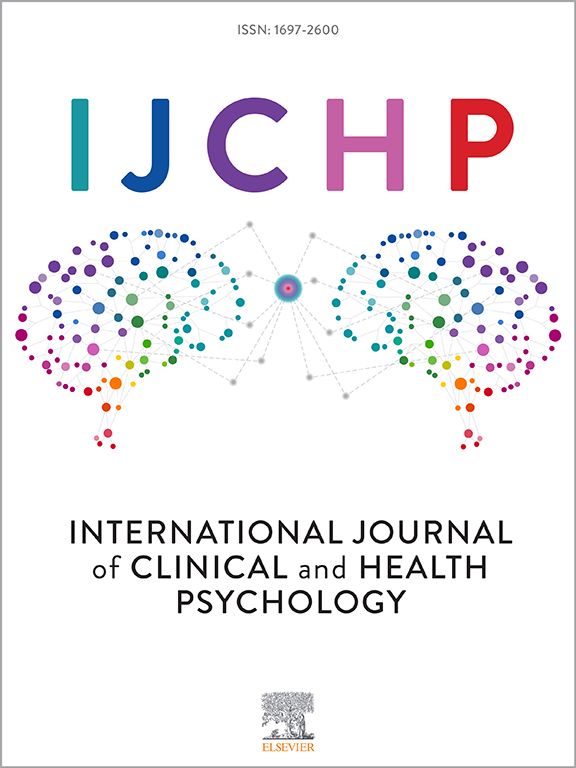延长儿童障碍(ECD):建议和初步经验支持一个新的基于生态学的青少年功能障碍诊断类别
IF 4.4
1区 心理学
Q1 PSYCHOLOGY, CLINICAL
International Journal of Clinical and Health Psychology
Pub Date : 2025-04-01
DOI:10.1016/j.ijchp.2025.100572
引用次数: 0
摘要
背景/目的尽管青少年功能障碍在许多非西方文化中通常不存在,但现有的青少年功能障碍诊断类别通常是指假设的生物学或发育因素。在美国和其他西方国家,这种类型的诊断分类并不能公正地对待许多青少年问题的社会原因。为了更加强调已知的青少年功能障碍的文化原因,我们建议采用一种基于生态学的诊断类别,我们称之为“扩展儿童障碍”(ECD),其特征是:(1)过度的,有时有害的同伴参与,(2)围绕权威人物的控制问题的冲突,以及(3)围绕权威人物的控制问题的情绪问题。方法对5198名个体进行了评估,包括他们自己或治疗师、咨询师、老师或家长:3147名女性、1750名男性和301名其他人群,平均年龄23.4岁。54.3%的参与者来自美国,剩下的46.7%来自其他74个国家的说英语的人。结果ECD诊断测试的总分与幸福水平呈负相关,与愤怒、抑郁和焦虑水平呈正相关,无论是自我报告还是他人报告(注意ECDI得分越高表明功能障碍越严重)。总分还预测了13个具有临床意义的标准变量。值得注意的是,在我们的样本中,ECD的患病率与2010年美国青少年疾病共病调查估计的患病率大致相符。结论:ECD诊断类别应被视为一种可行的替代方法,以替代目前强调假设的流行病或神经缺陷的青少年问题诊断。本文章由计算机程序翻译,如有差异,请以英文原文为准。
Extended childhood disorder (ECD): Proposal and preliminary empirical support for a new ecologically-based diagnostic category of teen dysfunction
Background/Objective
Existing diagnostic categories of teen dysfunction often refer to hypothetical biological or developmental factors, even though teen dysfunction is often absent in many non-Western cultures. Diagnostic categories of this sort do not do justice to the social causes of many teen problems in the United States (U.S.) and other Western countries. To put more emphasis on known cultural causes of teen dysfunction, we propose adopting an ecologically-based diagnostic category we call “extended childhood disorder” (ECD), characterized by (1) excessive and sometimes harmful involvement with peers, (2) conflict centering around control issues with authority figures, and (3) mood problems centering around control issues with authority figures.
Method
5198 individuals were evaluated, either by themselves or by therapists, counselors, teachers, or parents: a diverse group of 3147 females, 1750 males, and 301 others, mean age 23.4. 54.3 % of the participants were from the U.S., and the remaining 46.7 % were English speakers in 74 other countries.
Results
Total scores on a diagnostic test of ECD were negatively correlated with level of happiness and positively correlated with levels of anger, depression, and anxiety, whether reported by self or others (note that higher scores on the ECDI indicate greater dysfunction). Total scores were also predictive of 13 clinically significant criterion variables. Notably, prevalence of ECD in our sample roughly matched the 2010 National Comorbidity Survey estimates of the prevalence of teen disorders in the U.S.
Conclusion
The ECD diagnostic category should be considered as a viable alternative to current diagnoses of teen problems that emphasize hypothetical endemic or neural deficits.
求助全文
通过发布文献求助,成功后即可免费获取论文全文。
去求助
来源期刊

International Journal of Clinical and Health Psychology
PSYCHOLOGY, CLINICAL-
CiteScore
10.70
自引率
5.70%
发文量
38
审稿时长
33 days
期刊介绍:
The International Journal of Clinical and Health Psychology is dedicated to publishing manuscripts with a strong emphasis on both basic and applied research, encompassing experimental, clinical, and theoretical contributions that advance the fields of Clinical and Health Psychology. With a focus on four core domains—clinical psychology and psychotherapy, psychopathology, health psychology, and clinical neurosciences—the IJCHP seeks to provide a comprehensive platform for scholarly discourse and innovation. The journal accepts Original Articles (empirical studies) and Review Articles. Manuscripts submitted to IJCHP should be original and not previously published or under consideration elsewhere. All signing authors must unanimously agree on the submitted version of the manuscript. By submitting their work, authors agree to transfer their copyrights to the Journal for the duration of the editorial process.
 求助内容:
求助内容: 应助结果提醒方式:
应助结果提醒方式:


